Mendelianum as a part of the Moravian Museum in Brno
The Mendelianum Committee of the Moravian Museum
will award the 2024 Mendel Memorial Medal
to Daniel L. Hartl for his contribution to the development of Gregor Mendel's legacy and the interpretation of his scientific work.
The medal, which is awarded annually, recognizes significant contributions to the advancement of Mendel’s scientific and cultural legacy.
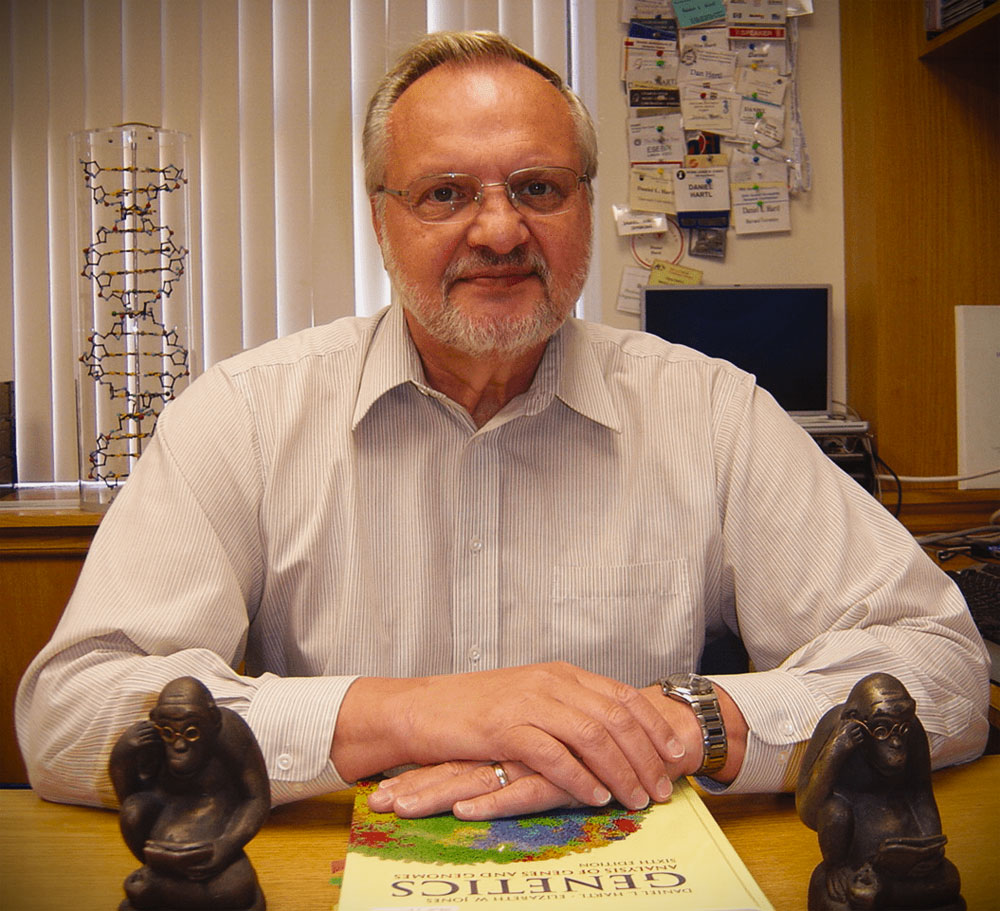 Daniel L. Hartl (born 1943) is the Higgins Professor of Biology in the Department of Organismic and Evolutionary Biology at Harvard University. He also is a Past President of the Genetics Society of America and the Society for Molecular Biology and Evolution, and very well known as a population geneticist. He has authored more than 400 scientific articles and more than 35 books in various aspects of genetics and evolution.
Daniel L. Hartl (born 1943) is the Higgins Professor of Biology in the Department of Organismic and Evolutionary Biology at Harvard University. He also is a Past President of the Genetics Society of America and the Society for Molecular Biology and Evolution, and very well known as a population geneticist. He has authored more than 400 scientific articles and more than 35 books in various aspects of genetics and evolution.
Daniel L. Hartl worked extensively with Vítězslav Orel (former head of the Mendelianum in 1965-1989) on countering some of the revisionist history of Mendel in the 1990s, especially in response to R. C. Olby’s publications. He recently published an article on Mendel in 2022, and published others in previous years. The awarding of the Mendel Memorial Medal is a tribute to his dedication and achievements in this field.
Here is a selection of some of his key publications on Mendel:
Hartl D. L. (2022). Gregor Johann Mendel: From peasant to priest, pedagogue, and prelate. Proceedings of the National Academy of Sciences of the United States of America, 119(30), e2121953119. https://doi.org/10.1073/pnas.2121953119
Franklin, A., Edwards, A. W. F., Fairbanks, D. J., Hartl, D, L. & Seidenfeld, T. (2008). Ending the Mendel-Fisher Controversy. University of Pittsburgh Press. https://upittpress.org/books/9780822959861/
Hartl, D. L., & Fairbanks, D. J. (2007). Mud sticks: on the alleged falsification of Mendel's data. Genetics, 175(3), 975–979. https://doi.org/10.1093/genetics/175.3.975
Orel, V., & Hartl, D. L. (1994). Controversies in the Interpretation of Mendel’s Discovery. History and Philosophy of the Life Sciences, 16(3), 423–464. http://www.jstor.org/stable/23331700
Hartl, D. L., & Orel, V. (1992). What did Gregor Mendel think he discovered? Genetics, 131(2), 245–253. https://doi.org/10.1093/genetics/131.2.245
The Mendel Memorial Medal is a unique annual award given to an internationally recognized figure for his or her contribution to the scientific and cultural legacy of Gregor Mendel and genetics. Past recipients of this award have included Nobel prize winners, outstanding researchers, pioneers in genetics, molecular biology, and the history of biology and genetics, as well as other eminent scientists. Last year saw the thirtieth anniversary of the start of the award. Its origin, however, goes back much deeper and is firmly linked to the tradition of developing Mendel’s scientific legacy at the Mendelianum of the Moravian Museum in Brno.
Recipients of the Mendel Memorial Medal:
2023 P. van Dijk, KeyGene, Wageningen
2022 U. Hoßfeld, Friedrich Schiller University, Jena
2021 T. Nagata, University of Tokyo, Hosei University
2020 J. Sölkner, BOKU, Vienna
2019 C. Laukaitis, University of Arizona Cancer Center, Tucson
2018 W. Wackernagel, Carl von Ossietzky University, Oldenburg
2017 D. J. Fairbanks, Utah Valley University, Orem
2016 J. Vollmann, BOKU, Vienna
2015 A. Matalová, Mendelianum, Brno
2014 H. Lesot, University of Strasbourg
2013 F. Di Trocchio, Sapienza University of Rome
2012 R. C. Karn, University of Arizona
2011 S. Zadražil, Charles University, Prague
2010 W. Mann, Theresia Mendel’s descendant, Darmstadt
2008 J. D. Watson, Cold Spring Harbor Laboratory, Long Island
2007 D. Lane, Institute of Molecular and Cell Biology, Singapore
2006 M. W. Nirenberg, Lab. of Biochem. Genetics, NIH, Bethesda
2005 J. Lužný, Mendel University, Brno
2004 J. Šmarda, Masaryk University, Brno
2003 P. T. Sharpe, Guy’s Hospital, London
2002 J. Klein, Max-Planck-Institut für Biologie, Tübingen
2001 L. Lojda, Univ. of Veterinary and Pharm. Sciences, Brno
2000 C. Kovář, Mendel’s Beehouse, Brno
1999 F. W. Anders, Institute of Genetics, Giessen
1998 F. Brückner, Crop Research Institute, Kroměříž
1995 V. N. Soyfer, George Mason University, Fairfax
1994 F. J. Ayala, University of California, Irvine
1993 F. Weiling, University of Agriculture, Bonn
1992 B. Jennings, Hastings Centre, Briarcliff Manor, New York
1992 T. Hirano, Japan Mendel Society, Tokyo
1992 H. Galjaard, Erasmus University, Rotterdam
 CZ
CZ  EN
EN 




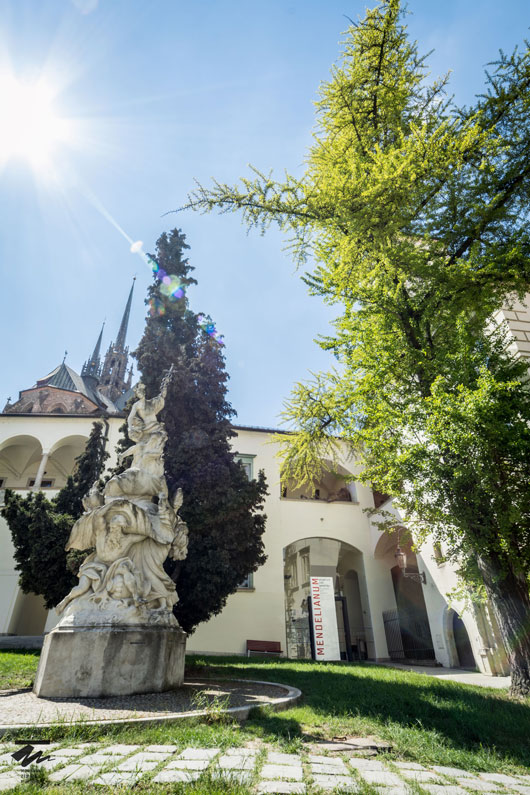
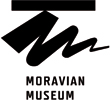
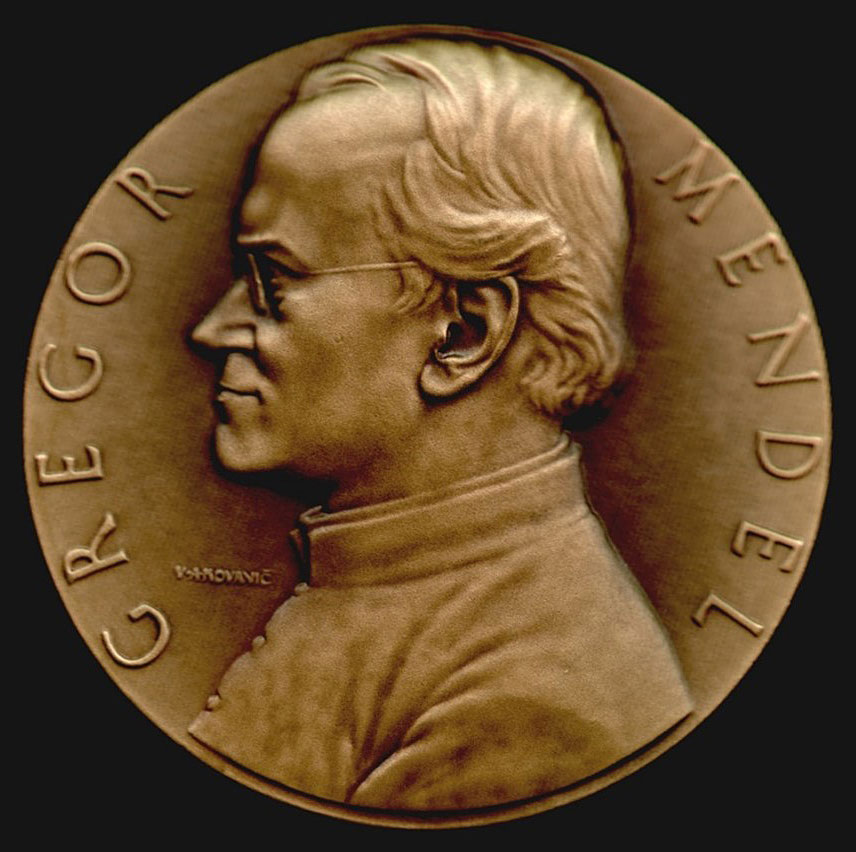
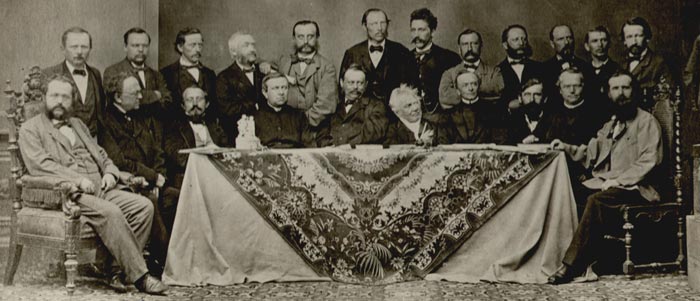 J. G. Mendel - scientist and a multifaceted personality.
J. G. Mendel - scientist and a multifaceted personality.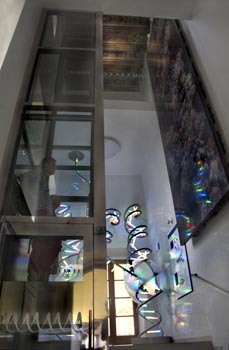 Introductive section: From the genetic program to its implementation.
Introductive section: From the genetic program to its implementation.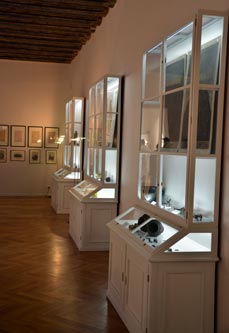 Scientific milieu of Mendel´s discovery: A trip to Mendel´s epoch.
Scientific milieu of Mendel´s discovery: A trip to Mendel´s epoch.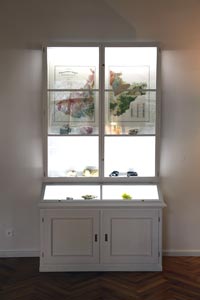 Conference Hall: the place where Mendel was meeting his scientific colleagues and gathered motivation for his experiments.
Conference Hall: the place where Mendel was meeting his scientific colleagues and gathered motivation for his experiments.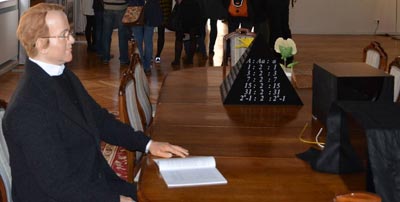 Mendel's laboratory: disclosure what Mendel knew and what he could not know.
Mendel's laboratory: disclosure what Mendel knew and what he could not know.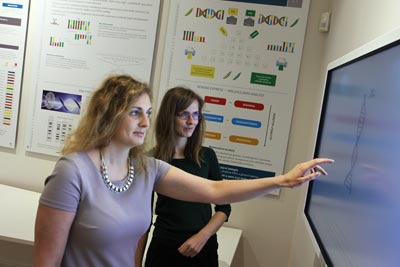 Molecular-biological laboratory: The desire to explore and discover.
Molecular-biological laboratory: The desire to explore and discover.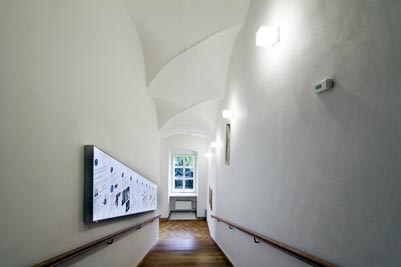 Genetic stories on the background of Nobel Prizes: Mendel in the concept of today's science
Genetic stories on the background of Nobel Prizes: Mendel in the concept of today's science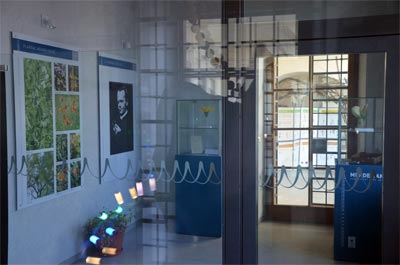 Mendel´s plants: Mendel's verification of his discoveries.
Mendel´s plants: Mendel's verification of his discoveries.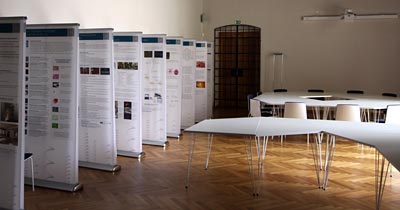 Historic hall and modern science: A counterpoint of old and new.
Historic hall and modern science: A counterpoint of old and new.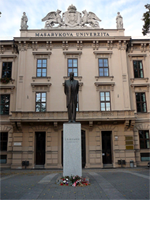 The building of the former Technical College where the meetings of the Nature Research Society were held over which Mendel often presided in his position of society´s vice-chairman (Komenského náměstí 2).
The building of the former Technical College where the meetings of the Nature Research Society were held over which Mendel often presided in his position of society´s vice-chairman (Komenského náměstí 2).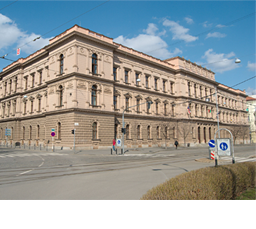 The building of the former Moravian Diet where the premises of the Mortgage Bank were situated from 1878. Mendel was working there as
The building of the former Moravian Diet where the premises of the Mortgage Bank were situated from 1878. Mendel was working there as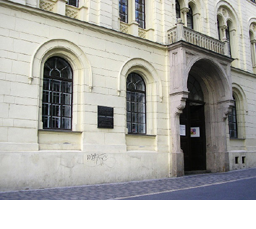 The building of the Modern High School in Brno where Mendel lectured physics and natural science 1854-1868 and published his discovery in 1865 in the Nature Research Society meetings (Jánská 22).
The building of the Modern High School in Brno where Mendel lectured physics and natural science 1854-1868 and published his discovery in 1865 in the Nature Research Society meetings (Jánská 22).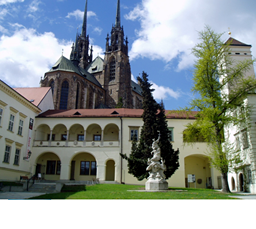 The Bishop Court became the Moravian Museum and the seat of the AgriCulture Association with its many scientific sections in 1817. Mendel profited most from the gardening section. The experiments performed to achieve new colour varieties of ornamental plants initiated his experiments with peas (Muzejní 1).
The Bishop Court became the Moravian Museum and the seat of the AgriCulture Association with its many scientific sections in 1817. Mendel profited most from the gardening section. The experiments performed to achieve new colour varieties of ornamental plants initiated his experiments with peas (Muzejní 1).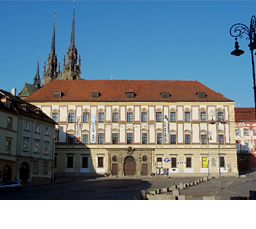 The Dietrichstein Palace of the Moravian Museum with its memorial hall showing plaques of the chief figures of the AgriCulture Association as founders of the Moravian Museum (Zelný trh 1).
The Dietrichstein Palace of the Moravian Museum with its memorial hall showing plaques of the chief figures of the AgriCulture Association as founders of the Moravian Museum (Zelný trh 1).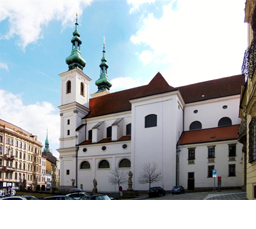 The Institute of Theology at the Dominican Monastery where Mendel studied 1844-1848. In St Michael church he was ordained priest on August 15, 1847 and celebrated his first mass (Dominikánské náměstí).
The Institute of Theology at the Dominican Monastery where Mendel studied 1844-1848. In St Michael church he was ordained priest on August 15, 1847 and celebrated his first mass (Dominikánské náměstí).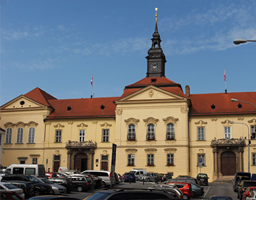 The New Town Hall as a centre of cultural events and presentations of the AgriCulture Association activities in which Mendel took part as a member of its Central Board (Dominikánské náměstí).
The New Town Hall as a centre of cultural events and presentations of the AgriCulture Association activities in which Mendel took part as a member of its Central Board (Dominikánské náměstí).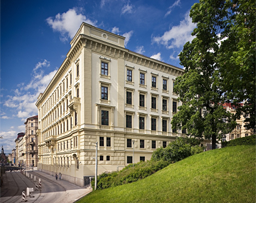 The Urban Centre where the office and the library of the Nature Research Society were housed after 1870 (Šilingrovo náměstí).
The Urban Centre where the office and the library of the Nature Research Society were housed after 1870 (Šilingrovo náměstí).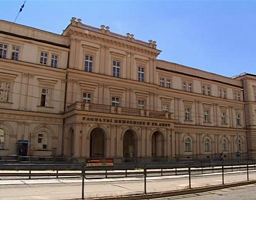 St. Ann Hospital where Mendel proved unsuccessful in his pastoral service but achieved the support of the hospital director in ornamental plant breeding and meteorology (Pekařská 53/55).
St. Ann Hospital where Mendel proved unsuccessful in his pastoral service but achieved the support of the hospital director in ornamental plant breeding and meteorology (Pekařská 53/55).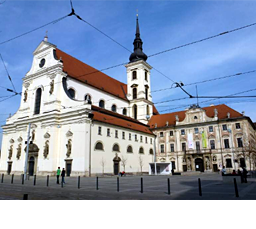 The original seat of the Augustinian Order St. Thomas to 1782 (Moravské náměstí).
The original seat of the Augustinian Order St. Thomas to 1782 (Moravské náměstí).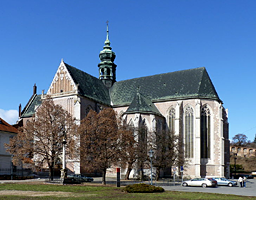 The former Cistercian Nunnary, since 1783 the seat of the Augustinian Order. Mendel lived there 1843-1884. The Basilica of the Assumption of the Virgin and the adjoining prelate quarters of Gregor Mendel 1868-1884 (Mendelovo náměstí 1).
The former Cistercian Nunnary, since 1783 the seat of the Augustinian Order. Mendel lived there 1843-1884. The Basilica of the Assumption of the Virgin and the adjoining prelate quarters of Gregor Mendel 1868-1884 (Mendelovo náměstí 1).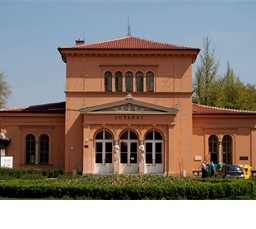 The Reduta Theatre where exhibits of flowers, fruit and vegetable were organized by Mendel´s Section of Pomiculture, Viniculture and Horticulture of the AgriCulture Association (Zelný trh).
The Reduta Theatre where exhibits of flowers, fruit and vegetable were organized by Mendel´s Section of Pomiculture, Viniculture and Horticulture of the AgriCulture Association (Zelný trh).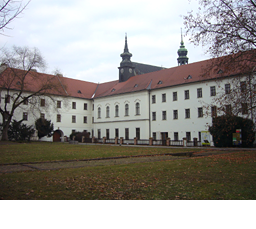 The former Cistercian Nunnary, since 1783 the seat of the Augustinian Order. Mendel lived there 1843-1884. The Basilica of the Assumption of the Virgin and the adjoining prelate quarters of Gregor Mendel 1868-1884 (Mendelovo náměstí 1).
The former Cistercian Nunnary, since 1783 the seat of the Augustinian Order. Mendel lived there 1843-1884. The Basilica of the Assumption of the Virgin and the adjoining prelate quarters of Gregor Mendel 1868-1884 (Mendelovo náměstí 1).